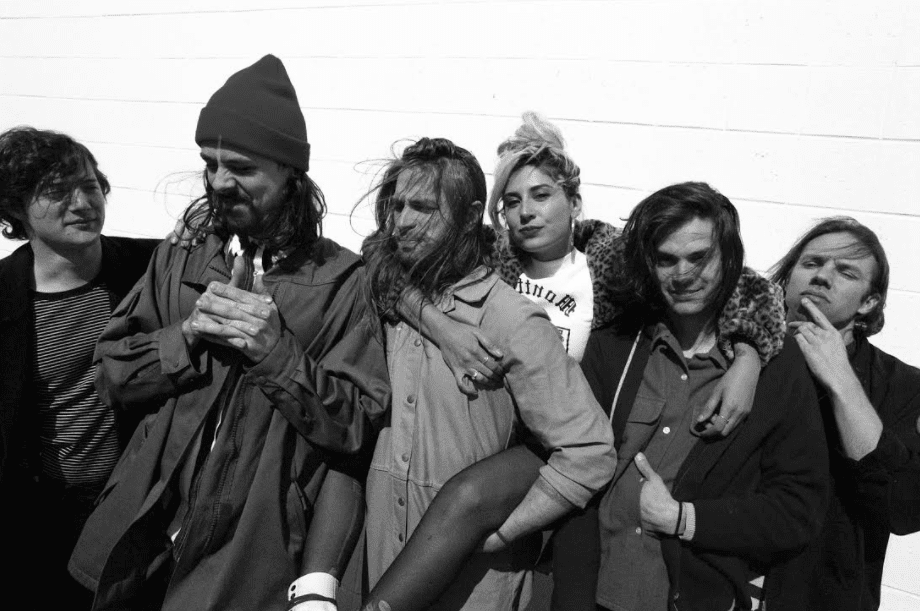
“I’m sorry, I’m in the middle of the desert,” Stef Chura tells me, after our call has dropped off for the third time. Chura, who has been on tour with her band since August 28th, is driving through Texas to meet up with Jay Som in El Paso. Then, she tells me, they’ll “maybe go to a hot spring.” They were hoping to go camping, but it’s raining now.
My whole call with Chura is like this: casual, wandering, warm. As we catch up before her Columbus show at Skully’s Music Diner on 10/4, she tells me about the “hard Canadian bagels” they ate in Montreal, and the park they relaxed in before their show. Another time, Chura recalls, they played at Meow Wolf in Santa Fe, New Mexico, which she describes as “ a crazy museum, and the venue is a little stage inside the actual art piece.” Next she mentions a time that the “sex shop” located next to their venue had a “tunnel of love” made up of a rickety bridge and turning swirly lights. But not all of their tour has been this fun and breezy. Chura describes a show in Madison, Wisconsin, when a man walked up in front of the crowd to heckle her. “He can really play!” the man shouted, referring to Chura’s touring bassist, Collin Dekuiper. “Can you play like him?”
At a different gig, Chura says, “I was standing right next to [fusion_builder_container hundred_percent=”yes” overflow=”visible”][fusion_builder_row][fusion_builder_column type=”1_1″ background_position=”left top” background_color=”” border_size=”” border_color=”” border_style=”solid” spacing=”yes” background_image=”” background_repeat=”no-repeat” padding=”” margin_top=”0px” margin_bottom=”0px” class=”” id=”” animation_type=”” animation_speed=”0.3″ animation_direction=”left” hide_on_mobile=”no” center_content=”no” min_height=”none”][Dekuiper], and the sound guy walked up to the stage. And I could tell he wanted to talk to the bass player so much more than me.” Things like this “just happen,” Chura tells me. But at this point in her career, Chura is too focused on her music to talk about her gendered experiences in the music industry for long. “I think I’m starting to get bleaker as I get older,” she says.

And the music that Chura makes is worth focusing on. Messes, her debut album, is pointed and thoughtful, with expansive arrangements and rumbling guitar riffs. Since the release, Chura and her band have recorded a live EP with Audiotree – recordings with as much air and sprawl as Messes, but infused with the urgency captured during a live performance. Lyrically, Chura drifts through and between varied characters, scenes, and metaphors. “I don’t write in a story-line,” she tells me, “so a lot of the songs are more chaotic for me […] one verse will be about one thing, and another part of the song will be about something completely different.”
What pulls Chura’s lyrics together, however, is her continued exploration of the power dynamics that mold and complicate human interactions. Chura says that when she wrote Messes, she “thought about the songs as having such different content, [but] when they were all together and I was talking to more people about the songs, I realized that there was a theme that I hadn’t expected to be there. The songs are not mostly about romantic relationships, and [are] mostly about power struggles in my life.” Yet Chura’s work is not always read within this nuanced framework. She tells me about one review of Messes’ stand-out “Slow Motion” that particularly impacted her after the reviewer read the song as about “a crush and romance.” “I was super devastated that that’s what my whole music career was going to be like,” she says, “that people were going to think I was just some love-struck girl, writing about my crushes.
A deep-dive into her work reveals that Chura is anything but “love-struck.” While examining power and control, Chura never loses her grasp of intentionality. It’s this self-awareness, nestled within her densely descriptive lyrics, that drew me into her music in the first place. “There you were / Falling through / my hands like sand,” Chura sings on “Faded Heart.” It’s a spare lyric, but an effective one––dry, textured imagery balances the saccharine potential of the song’s title. In fact, Chura tells me, that lyric was inspired by a Joni Mitchell documentary she found at the dollar store.
“It was a really amazing documentary to be only a dollar,” she says, laughing. Chura explains to me that the documentary explored, in part, one of Mitchell’s romantic break-ups, and the letter that break-up produced. In the letter, Chura says, Mitchell wrote “something like: ‘if you hold sand in your hands too tightly, it will just fall through.’” That image stuck with Chura, eventually insinuating itself into the album. But Chura’s approach to the lyric, as always, was rooted in something more complicated than just a crush. “I wrote that song about my friend who passed away,” she says.
Chura’s on the longest tour of her career right now, but as she talks, she seems as motivated as ever. “We’re playing new stuff right now,” she says, “and we’re actually making a new record when we get [back] to Detroit. We definitely have enough stuff for our new album.” Along with the new material, the band has tweaked a few things for their performances: adding bass lines where songs didn’t have them, etc. “Also,” Chura jokes, “I pause ‘Time to Go’ to do the splits. “
 Along with recording the new album, once home in Detroit, Chura will pick up her karaoke business, which gets put on hold during tour. “[I’ll] have three nights at a couple of bars throughout town,” she tells me. She’s a true karaoke believer: organizing each night doesn’t stop Chura from participating too. “You really have to [sing] the song you’re feeling,” she says. And right now, what she’s feeling is “Drops of Jupiter” by Train. “It’s such a good song!” she says, laughing. “It’s a song that nobody wants to know the lyrics to but they do. And it’s a little embarrassing.”
Along with recording the new album, once home in Detroit, Chura will pick up her karaoke business, which gets put on hold during tour. “[I’ll] have three nights at a couple of bars throughout town,” she tells me. She’s a true karaoke believer: organizing each night doesn’t stop Chura from participating too. “You really have to [sing] the song you’re feeling,” she says. And right now, what she’s feeling is “Drops of Jupiter” by Train. “It’s such a good song!” she says, laughing. “It’s a song that nobody wants to know the lyrics to but they do. And it’s a little embarrassing.”
Chura tells me that the new album, like Messes, will mix new songs with older material. “I was feeling pressure that all of the songs had to be brand new,” she says, “but that’s not true. It’s kind of nice to work with the old stuff.” Opening up the time-frame of the album has worked for Chura before. “Speeding Ticket,” the oldest song on her debut album, is an understated recording with devastating, visceral lyrics.
At first, Chura says, she was “ashamed” to tell people she had written the song ten years ago. But she still really likes playing the song. “I’m not really bothered,” says Chura. “I was self-conscious at first but […] it’s a good song.” It’s true––it is a good song. Listening to “Speeding Ticket” feels like the few sleepy moments spent under covers after waking up, or the quiet warmth of a day inside during winter.
I think about how long Chura has been writing, and how many opportunities she has had to stop. Ultimately, this is what I love about Chura’s music, and about the unaffected, thoughtful way she speaks over the phone: she has put a lifetime of work into constructing her sound and her songs, and she knows it.
“I feel really sure about these songs,” she says.
 [/fusion_builder_column][/fusion_builder_row][/fusion_builder_container]
[/fusion_builder_column][/fusion_builder_row][/fusion_builder_container]




